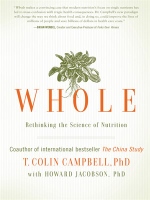 Whole: Rethinking the Science of Nutrition (2013) is a book that describes why a “wholistic” interpretation of nutrition is better than a reductionist one
Whole: Rethinking the Science of Nutrition (2013) is a book that describes why a “wholistic” interpretation of nutrition is better than a reductionist one
- Vegan, plant-based
- High whole carbohydrates, low fat, low protein
- Avoid heavily processed foods, animal products, added salt, oil, sugar
Get a copy of Whole for details of the author’s philosophy on the science of nutrition, why reductionism is harming our health, and the power players behind the status quo
The reasoning behind Whole
The author argues that the current state of poor health in the USA is because of a reductionist approach to nutrition, in which individually named macro- and micro-nutrients are considered more important than whole foods – which we have evolved to eat and we don’t fully understand. It claims that science demonstrates that a plant-based diet, without any animal products, is best for our health. It also says that complex systems of influence and power make it more difficult to move toward holistic (or, as the author prefers to spell it, wholistic) nutrition guidelines.
Dietary recommendations for Whole
The author suggests that you follow a whole foods, plant-based (WFPB) diet.
See The China Study for more detailed food recommendations from the author; note that Whole appears to be more strictly against processed foods.
Foods to eat in Whole
- Consume plant-based foods in forms as close to their natural state as possible (“whole” foods)
- Eat a variety of vegetables, fruits, raw nuts and seeds, beans and legumes, and whole grains
- Aim to get 80% of your calories from carbohydrates, 10% from fat, and 10% from protein
Foods to avoid in Whole
- Avoid heavily processed foods
- Avoid animal products
- Stay away from added salt, oil, and sugar
Health benefits claimed in Whole
The diet in this book claims to reduce the risks for: acne, arthritis, atherosclerosis, cancer, chronic pain, colds and flu, type 2 diabetes, erectile dysfunction, heart disease, intestinal distress, macular degeneration, migraines/headaches, stroke
As always, this is not intended to be a replacement for professional medical diagnosis or treatment for a medical condition. Consult your doctor before starting a new diet. This page describes what the authors of the diet recommend – Chewfo is describing the diet only, and does not endorse it.
Get a copy of Whole for details of the author’s philosophy on the science of nutrition, why reductionism is harming our health, and the power players behind the status quo
How has this diet helped you? Please add a comment below.

{ 0 comments… add one }